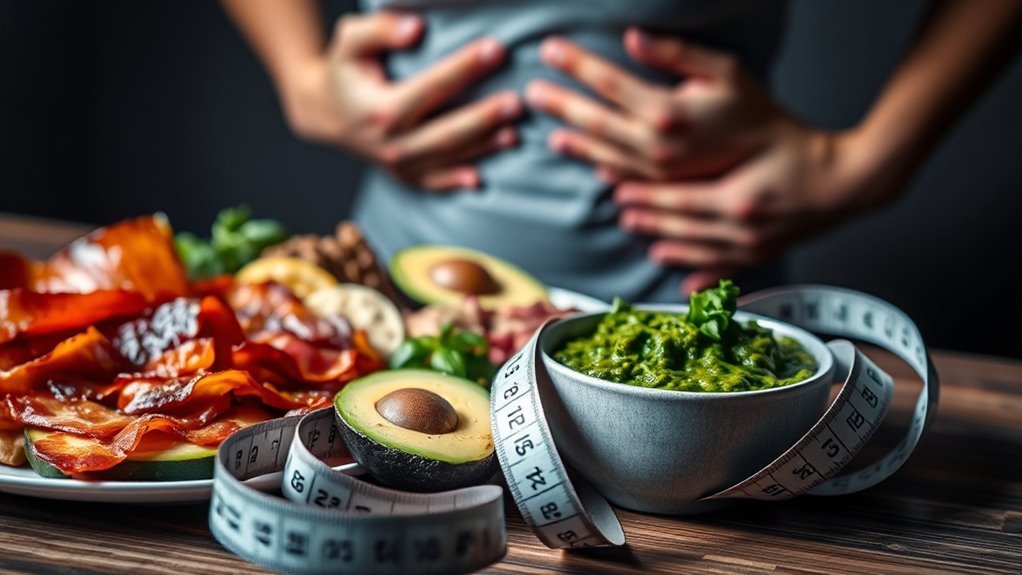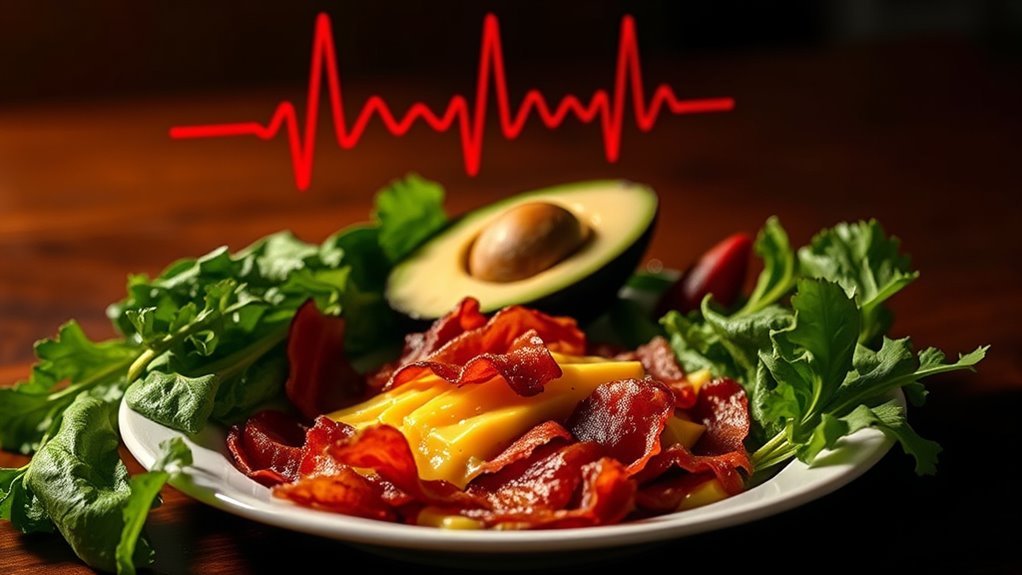The keto diet can lead to nutritional deficiencies, causing fatigue and muscle cramps. It might disrupt digestion, resulting in bloating and gas due to low fiber intake. Mental health may suffer from low serotonin levels, leading to mood swings and anxiety. Additionally, it can affect physical performance and hormonal balance, possibly resulting in fatigue and weight gain. While some people see benefits, it’s essential to weigh these factors and explore more about the potential downsides.
Nutrient Deficiencies and Imbalances

While the keto diet can offer benefits like weight loss and improved blood sugar control, it may also lead to nutrient deficiencies and imbalances if not carefully managed. When you drastically reduce carbohydrate intake, you might compromise your vitamin absorption and mineral balance. Essential nutrients such as magnesium, potassium, and certain B vitamins may fall short, leading to fatigue or muscle cramps. To maintain peak health, it’s crucial to incorporate a variety of nutrient-dense foods, including leafy greens, nuts, and quality proteins. You can also consider supplementation to address specific deficiencies. By being proactive about your nutrient intake, you can enjoy the freedoms of the keto lifestyle while safeguarding your overall well-being. Awareness is key to making informed choices.
Digestive Issues and Gastrointestinal Discomfort

As you commence on the keto diet, you might encounter digestive issues and gastrointestinal discomfort due to the significant changes in your food intake. A lower fiber intake can disrupt your gut microbiome, leading to bloating symptoms and other discomforts. This shift may also affect your body’s production of digestive enzymes, which are essential for breaking down food effectively.
| Issue | Impact |
|---|---|
| Low Fiber Intake | Disruption to gut microbiome |
| Bloating Symptoms | Increased gas and discomfort |
| Digestive Enzymes | Potential digestive inefficiency |
Finding a balance in your diet can help mitigate these symptoms, so consider gradually introducing fiber-rich foods to support your digestive health.
Increased Risk of Heart Disease

When considering the keto diet, it’s important to be aware of its potential impact on heart health. Some studies suggest that the high fat content can lead to elevated cholesterol levels and increased inflammation, which may affect your blood vessels. Additionally, nutrient deficiencies from restrictive eating could further compromise heart function, making it essential to approach this diet with caution.
Elevated Cholesterol Levels
Although the ketogenic diet can lead to significant weight loss and improved metabolic markers for some, it’s vital to be aware of its potential impact on cholesterol levels. Elevated cholesterol can pose risks to heart health, making cholesterol management imperative for those considering this diet.
| Cholesterol Type | Effect on Heart Health |
|---|---|
| LDL (Bad) | Increased risk |
| HDL (Good) | Protective factor |
| Triglycerides | May rise |
While some individuals may experience an increase in HDL, the rise in LDL and triglycerides can overshadow these benefits. It’s important to monitor your cholesterol levels regularly, especially if you’re on the keto diet, to make sure your heart health isn’t compromised.
Inflammation and Blood Vessels
While the ketogenic diet can offer benefits such as weight loss, it may also contribute to inflammation, which is a crucial factor in the development of heart disease. Here are three ways the diet could impact your vascular health:
- Chronic Inflammation: The high-fat content might promote inflammation in some individuals, leading to increased arterial stiffness.
- Nutrient Imbalance: A restricted intake of fruits and vegetables can lead to a deficiency in antioxidants, which help combat inflammation.
- Impact on Blood Vessels: Inflammation can damage blood vessels over time, increasing the risk of heart disease.
It’s essential to weigh these risks against the potential benefits. Before committing to the keto diet, consider how it may affect your long-term vascular health and overall well-being.
Nutrient Deficiencies Impacting Heart
Nutrient deficiencies can greatly impact your heart health, potentially increasing the risk of heart disease. A ketogenic diet often limits various food groups, which can lead to reduced nutrient absorption. Essential vitamins and minerals like potassium, magnesium, and fiber might be insufficient, and these nutrients play an important role in maintaining cardiovascular function. For instance, a lack of potassium can lead to elevated blood pressure, while inadequate magnesium levels may contribute to irregular heart rhythms. Furthermore, fiber helps reduce cholesterol levels, promoting overall heart health. While the keto diet may offer short-term benefits, it’s essential to guarantee that your nutrient intake supports long-term heart health to mitigate potential risks effectively. Prioritizing a balanced diet can help safeguard your heart.
Negative Impact on Mental Health
The keto diet, often praised for its weight loss benefits, can also have a negative impact on mental health, particularly for those unaccustomed to such drastic dietary changes. You might experience:
- Increased Anxiety Disorders: The lack of carbohydrates can lead to low serotonin levels, heightening feelings of anxiety.
- Mood Swings: The rapid shifts in energy levels can trigger irritability and emotional instability, making it tough to maintain a balanced mood.
- Cognitive Decline: A shortage of glucose may impair cognitive function, leading to difficulties in concentration and memory.
These factors combined can elevate stress levels, further complicating your mental well-being. It is crucial to weigh these potential downsides before committing to the keto lifestyle.
Sustainability and Long-Term Adherence
Mental health challenges can complicate your journey with the keto diet, but sustainability and long-term adherence pose their own set of concerns. While it may offer short-term success for weight loss, many find it difficult to maintain over time. The strict nature of the keto diet can lead to feelings of deprivation, making behavioral changes tough to sustain. You might feel free initially, but that freedom can quickly turn into a burden if you struggle to stick to the regimen. For lasting results, it’s essential to adopt a balanced approach that fits your lifestyle. Developing healthier habits and finding flexibility in your food choices can help you maintain your goals without feeling trapped by a restrictive diet.
Social and Lifestyle Constraints
When you’re on a keto diet, social gatherings can become tricky as many popular foods and snacks are high in carbs. You might find your options limited at restaurants or events, which can complicate your experience. Additionally, family meals can pose challenges if others aren’t following the same dietary restrictions, leading to potential conflicts or feelings of isolation.
Social Gatherings Challenges
Maneuvering social gatherings can be particularly challenging for those on a keto diet, as many traditional foods and snacks are high in carbohydrates. You may feel social pressure to indulge in menu options that don’t align with your dietary goals. Here are a few common challenges:
- Limited Choices: Many gatherings feature foods that are not keto-friendly, making it hard to find suitable options.
- Peer Influence: Friends and family may encourage you to “just have a bite,” which can complicate your commitment.
- Feeling Excluded: You might feel left out when others enjoy treats that are off-limits for you.
Navigating these situations requires planning and confidence in your choices, ensuring you can still enjoy social interactions without compromising your health goals.
Limited Food Choices
Although maintaining a keto diet can offer various health benefits, limited food choices often pose significant social and lifestyle constraints. You might find it challenging to enjoy meals with friends or family due to strict food variety and recipe limitations. This can make dining out or attending events feel restrictive.
| Meal Type | Keto-Friendly Options | Non-Keto Options |
|---|---|---|
| Breakfast | Eggs, Avocado | Pancakes, Cereal |
| Lunch | Salad, Grilled Chicken | Sandwiches, Pasta |
| Dinner | Zucchini Noodles | Rice, Pizza |
| Snacks | Nuts, Cheese | Chips, Cookies |
These constraints can lead to feelings of isolation and frustration, as you’re constantly maneuvering a narrow path in social situations.
Family Meal Complications
Maneuvering family meals can become particularly complicated on a keto diet, especially since dietary preferences often differ among family members. You might find that balancing everyone’s needs is a challenge. Here are some considerations for effective family meal planning:
- Variety: Incorporate options that cater to both keto and non-keto eaters, ensuring everyone has something they enjoy.
- Communication: Discuss dietary preferences openly to make meal choices more inclusive and satisfying for all.
- Flexibility: Be prepared to adapt meals, swapping out ingredients to accommodate different diets without sacrificing flavor.
These complexities can strain family dynamics, but with a little creativity and understanding, you can navigate these challenges while maintaining your commitment to the keto lifestyle.
Effects on Physical Performance
When considering the effects of the keto diet on physical performance, it’s important to recognize both its potential benefits and drawbacks. While some athletes report enhanced fat oxidation, you might experience endurance loss, especially in high-intensity activities. The body adapts to burning fat for fuel, which can take time and may not suit everyone’s performance needs. Additionally, muscle recovery can be compromised due to lower glycogen stores, impacting your ability to train effectively. If you rely on quick energy bursts, the keto diet might not provide the immediate fuel your muscles crave. It’s vital to weigh these factors against your personal fitness goals, ensuring your dietary choices align with your performance aspirations.
Potential Hormonal Disruptions
When considering the keto diet, you might want to think about its potential effects on your hormones. Some studies suggest that a high-fat, low-carb diet could contribute to insulin resistance, which can impact your overall metabolic health. Additionally, there are concerns about how such a diet might affect thyroid function, potentially leading to issues with energy levels and weight management.
Insulin Resistance Concerns
While the ketogenic diet can offer benefits for weight loss and metabolic health, it also raises concerns about insulin resistance and potential hormonal disruptions. You might want to reflect on the following factors:
- Insulin Spikes: High-fat diets can lead to unexpected insulin spikes, challenging your body’s ability to manage blood sugar effectively.
- Hormonal Imbalance: Prolonged ketosis may disrupt hormones like cortisol and leptin, affecting appetite regulation and stress response.
- Adaptation Period: During the initial phases, your body may struggle to adjust, resulting in fluctuating blood sugar levels that can impact energy and mood.
Understanding these potential risks helps you make informed choices about your dietary path. Always consult with a healthcare professional before making significant changes to your diet.
Thyroid Function Impact
Although the ketogenic diet can promote weight loss and improve certain metabolic markers, it may also negatively affect thyroid function, potentially leading to hormonal disruptions. Research suggests that a significant reduction in carbohydrate intake might lower the levels of thyroid hormones, such as T3, which can reduce your metabolic rate. This drop in thyroid hormones can impact energy levels, mood, and overall health. If you’re following a strict keto diet, you might experience symptoms like fatigue or weight gain, which could be linked to these hormonal changes. It’s essential to monitor your thyroid function and consult with a healthcare professional if you notice any concerning signs. Balancing your diet and ensuring adequate nutrients can help support thyroid health.
Keto Flu and Initial Side Effects
As your body shifts into ketosis, you might experience what’s commonly referred to as the “keto flu,” a collection of symptoms that can arise in the early stages of the diet. During the adaptation period, it’s important to be aware of potential keto flu symptoms, which can include:
- Fatigue and lethargy
- Headaches and dizziness
- Nausea and digestive issues
These symptoms can be uncomfortable, but they’re generally temporary as your body adjusts to burning fat for fuel instead of carbs. Staying hydrated, replenishing electrolytes, and gradually reducing carbs can help ease these effects. While the keto flu can be a hurdle, many find it worth it for the long-term benefits of the diet. Embrace the process, and remember that this too shall pass.
Misconceptions About Fat and Weight Loss
What if everything you think you know about fat and weight loss is wrong? Many dietary myths suggest that eating fat makes you gain weight, but that’s not entirely true. Your body relies on fat metabolism for energy, especially when carbohydrates are limited. Instead of fearing dietary fat, consider how your body processes it. Healthy fats can actually promote satiety, helping you eat less overall. It’s essential to differentiate between healthy fats, like those from avocados and nuts, and unhealthy trans fats found in processed foods. By debunking these misconceptions, you can embrace a more balanced approach to nutrition, empowering yourself with knowledge. Ultimately, it’s about finding what works for you and your unique body.
Frequently Asked Questions about the Keto Diet
1. Why is the keto diet considered bad for some people?
The keto diet can be considered bad for some people due to its restrictive nature, which may lead to nutrient deficiencies. It drastically reduces carbohydrate intake, which can negatively affect energy levels, brain function, and overall health. Additionally, it may increase the risk of heart disease due to high fat intake, particularly saturated fats, which can elevate cholesterol levels in some individuals.
2. What are the possible side effects of the keto diet?
Common side effects of the keto diet include the “keto flu,” which can manifest as headaches, fatigue, nausea, dizziness, and irritability as the body adjusts to a low-carb lifestyle. Long-term adherence may lead to digestive issues, kidney stones, and liver problems. Additionally, some individuals may experience muscle loss due to inadequate carbohydrate intake, which is crucial for muscle recovery and growth.
3. Can the keto diet lead to disordered eating?
Yes, the restrictive nature of the keto diet can potentially trigger disordered eating patterns in some individuals. The focus on limiting carbohydrates can create an unhealthy relationship with food, leading to binge eating or a preoccupation with food choices. This can be particularly concerning for those with a history of eating disorders or body image issues.
4. Is the keto diet sustainable long-term?
Many experts believe that the keto diet is not sustainable for the long term due to its restrictive nature. Most individuals find it challenging to maintain such a low-carb intake over extended periods, which can lead to weight regain once normal eating patterns are resumed. Moreover, the diet may not provide all the necessary nutrients required for optimal health, making long-term adherence problematic.
5. Who should avoid the keto diet?
Individuals with certain health conditions should avoid the keto diet. These include those with pancreatitis, liver conditions, gallbladder issues, or a history of eating disorders. Additionally, people with type 1 diabetes should exercise caution as the diet can affect insulin levels. Consulting with a healthcare professional before starting the keto diet is crucial to assess individual health risks and needs.
References
- https://www.ncbi.nlm.nih.gov/pmc/articles/PMC7350531/
- https://www.health.harvard.edu/staying-healthy/the-ketogenic-diet
- https://www.mayoclinic.org/healthy-lifestyle/nutrition-and-healthy-eating/expert-answers/keto-diet/faq-20458653
- https://www.webmd.com/diet/obesity/keto-diet-overview
- https://www.who.int/news-room/questions-and-answers/item/fat-and-carbohydrates
- https://www.cdc.gov/healthyweight/assessing/bmi/adult_bmi/english_bmi_calculator/bmi_calculator.html
- https://www.eatright.org/health/disease-prevention/diabetes/understanding-the-ketogenic-diet
- https://www.verywellfit.com/the-keto-diet-5183890


